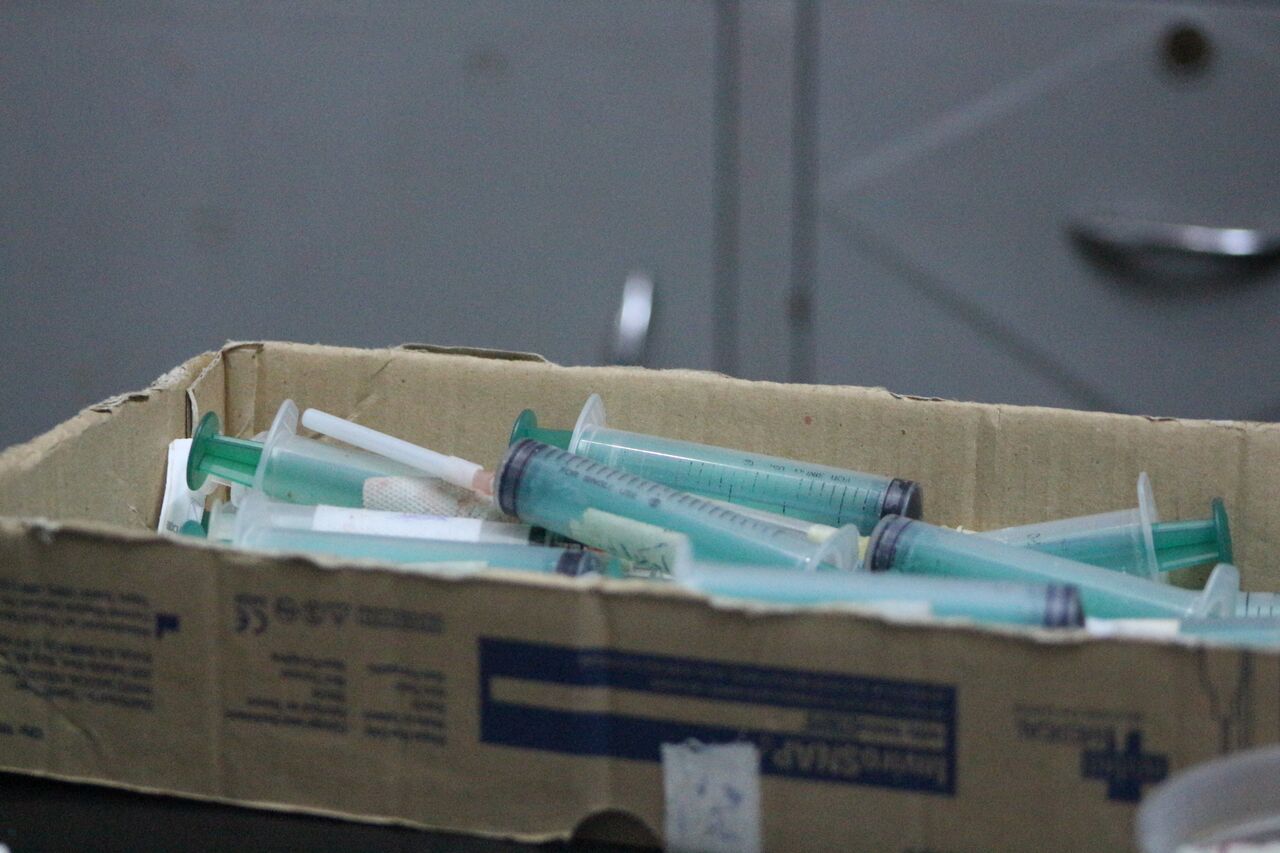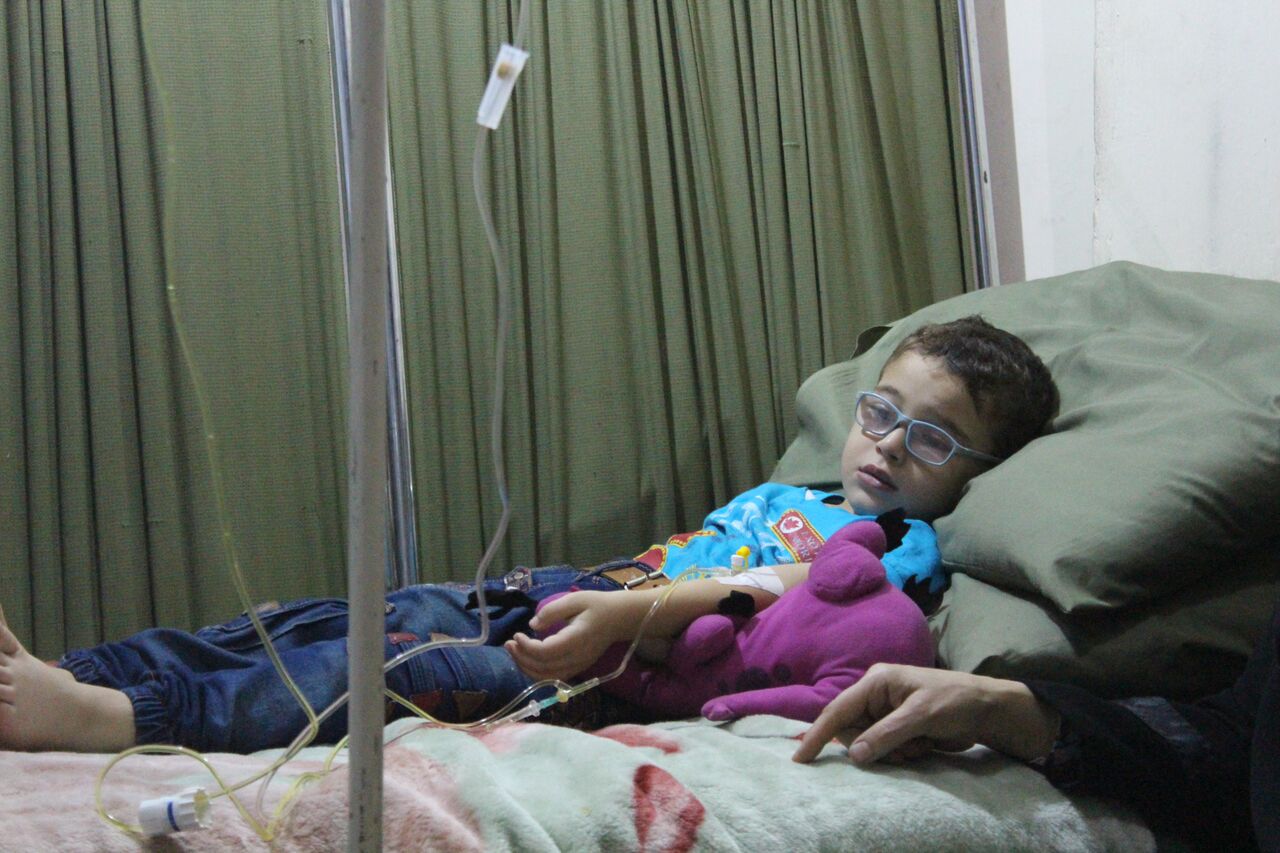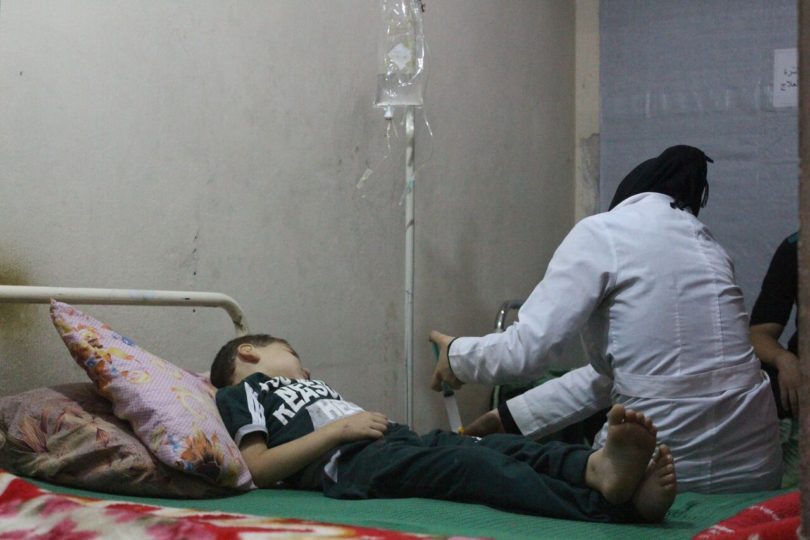By Ali Alibrahim and Ahmed Haj Hamdo
Published on Daraj Media
wiping away his tears of grief, Mohammed, a doctor in his forties at Dar al-Rahma Medical Center in the Eastern Ghouta area of rural Damascus, gathers the leftovermedicines from his desk inside a small bag.The doctor said: “The hundreds of cancer patients, whose health records have been stacked up in a wooden cabinet, have been waitig months for “salvation”.
Just now, Samer, a child who has not yet completedthe age of 5, accompanied by his grandmother, a 50-year-old woman, arrived to the Center, which is the only medical center specialized in treating cancer patients. He is among the 559 cancer patientsin the Ghouta,according to the center’s statistics. He is awaiting for doses of treatment, which have completely run outduring the siege imposed by the Syrian regime forces.
The grandmothersays, “his fatherhas beenimprisoned for about three years, while his mother has migrated to Egypt.So, he is left with me to look after.”
She adds thatSamer”was complained of pain in his stomach and feet.While providing medical examination for him, the doctorsdiscovered hehad blood cancer. we started to treat himin the Dar al-Rahma.But today, he is without treatment because doses are not available.”
Death threatens everyone
The siege on the eastern Ghouta, which includes dozens of villages, towns and cities and ispopulated by about 400,000 civilians, has imposed a dire situation on cancer patients due to the totallack of medical treatment and the destruction of the entire healthcare system.
First, Ghouta was partially besieged in October 2012.Then, almost a year later, in 2013, the siege wastightenedafter a military shift on the ground for the sake of the Syrian regime forces, which advanced from many axes.Consequently, the lives of the hundreds of injured people were in danger because of the interruption to the supply of medicines, amid the appeals bythemedical and relief arms of the United Nations, based in Damascus, to bring in the convoys of relief and medical assistance.
Again, in February 2017, the Syrian regime forces and allied militia carried out an assault on the Al-Qaboun and Tishreen districts northeast of the capital Damascus , taking control of all the tunnels used to smuggle medicines and necessities from the regime-controlled areas to besieged areas.As a result,theeastern Ghouta has been completely blockaded without any outlet and cut off from the world for eight months.

This prompted the World Health Organization (WHO) to express its “deep concern over the deteriorating health situation in theeastern Ghouta area of rural Damascus, and it called for immediately allowing life-saving aid.
The WHO confirmed that the three government hospitals in addition to 17 public healthcare facilities in the eastern Ghouta are not working, and thatpeople cannot reach them, pointing out that its health partners have allocated additional suppliesthat are readyto be delivered once the access is granted. But, the WHO has not been given permission for access.
“Within two weeks, all medicines will have beenrun out.If the siege continues, there will be a massacre committed against the sick,” said Dr. Wisam al-Ruz, a director of Dar al-Rahma Center.
Impossible dream of treatment
The lack of medical treatment has not only affected children, but also the elderly, women and the pregnant. Themedical treatment is now a dream as people say.
Sara, a woman in her 20s from Douma, has received cancer treatment for about a year inthe same center where Samer is treated. She reached a late stage of treatment and began to recover.But now, her health situation is worsening because she is deprived of medical doses which have run out, according to a specialist doctor at Dar al-Rahma Medical Center.
Sarah knows that the fate of cancer patients is “inevitable death”.”We are cancer patients.Although we are sure that our fate is inevitable death, we arehoping of living for a few more years, but even this hope has fadedas the siege continues,” she said calmly.
Sarah is among 559 cancer patients who are waiting for medicine,while their records remain stacked up inside Dar al-Rahma.Now, the Center can provide doses to only 3% of patients and their records are waiting a decision from the medical staff of the Center,according to the director of Dar al-Rahma, Wisam al-Roz.
Therefore, the Syrian Human Rights Network considered that the siege of al-Ghouta is a form of collective punishment. The network’s director, Fadel Abdel Ghani, emphasized that most of death cases caused by the siege were of vulnerable groups such as infants, the elderly, the sick, and the injuredin repeated bombardments, and there are no sufficient medicines to treat them. In addition, the siegehas reflected badly on chronic patients, especiallythose with cancer.
Escaping for treatment
over the last three months, 20 cancer patients have died in Dar al-Rahma Center, approximately every five days one of thecancer patientsdies.Such patients, including four children under 10 months old,were receiving medical treatment. But the Center is no longer able to renew its stock of anti-cancer drugs.

The Center has been rationing its limited stock of medicines because ofthe shortage of supplies. While, Prior to the siege, the Center managed to cure 37% of the cancer patients, and only 10% of them dieduntil the end of 2016, according to the director of the Center.
Because of the siege, the Center has been forced to change the course of treatment by reducing the amounts of doses given to some patients. As a result, those patients, who were recovering, have relapsed, according to a specialized nurse at the Center.
The treatment of cancer is divided into two types, the first through Chemotherapyand the second through radiotherapy. According to the director of Dar Al-Rahma Center, patientswere undergoingradiotherapy or chemotherapy or both, depending on the progression of cancer disease.
The medical staff of the Center confirmed to the author of this investigative report that patientswho needradiotherapy were going to Damascus through tunnels for treatment, which is only available atAl-NawawiHospital in the capitalDamascus, while we secured doses from the capital in different way to patients who are in need ofchemotherapy.
“But today after the closure of the tunnels, there is no possibility of providing either of the treatments, and the Center is in danger of running out of steam not for financial reasons but because there are no drugs to treat patients.”
Unavailable Drugs
What hinders access to medicines, which are completely unavailable, is because the production and supply is controlled by the Syrian Ministry of Health, which has prevented medicinesfrom enteringthe Ghouta and not allowed the patients to be evacuated to the hospitals of the capital Damascus, according to a number of patients and relief workers in the Harasta and Douma areas in the eastern Ghouta.
“Since the closure of the tunnels, which served as anunderground lifeline for half a million people, the cancer drugs have been cut off, andtoday, ifdrugsare available, their prices are very high and patients cannot afford them at all,” said BakrAbd al-Salam, a field doctor. “Some medicines cost more than a thousand dollars, which is anastronomical sum at the current timein the eastern Ghouta, while they don’t exceed a few pounds in value, in Damascus,” he added.
Treatment in Idlib
When asked by the journalists about the steps to stop the “disaster” threatening the lives of hundreds of patients, the World Health Organization said it has formally requested the Syrian government to evacuate patients from the eastern Ghouta in order to be treatedeither in Damascus or Idlib, according to their own will.
The WHO has been submitting to the Security Council a monthly report on the constraints and difficulties confronting the efforts to provide health and humanitarian assistance to the besiegedand hard-to-reach areas of Syria.
According to organization’s statements that the author of this investigative reportread, 7 tons of medical supplies, medicines and equipment were sent through inter-agency relief convoys to the health facilities in the besieged area, to which the last convoy got through on October 30, 2017.
Mr. Jan Egeland, UN humanitarian adviser for Syria,said:”400,000 People are trapped in the eastern Ghouta near Damascus, facing’completecatastrophe’, and hundreds of people need urgent medical evacuation. Deprived of being evacuated, Seven patients have died, and 28 patients, including 18 children, areon the brink of death. ”
Regarding cancer patients,who live under the threat of death with a tiny bit of hope, they have been included in the list submitted to the Syrian government and will be evacuated to receive appropriate treatment, according to the WHO.
Snowballing crisis
Mohammed Ali Asida, the most recent victim of the siege, died on Nov.4, 2017 in the town of Hazza in the eastern Ghouta, after his health situationdeteriorated due to bowel cancer and the lack of essential medicines.
Supposedly, the residents of the eastern Ghouta andof all the besieged cities in Syria should have been spared from this situation, as three months ago a deal, coming into effect on the 18th of last August, was agreed among the guarantor states of Iran, Russia and Turkey to set up de-escalation zones in the Eastern Ghouta and three other areas.
The section 7 of the agreement provides that ”the both partiesshall immediately take all necessary measures to imrove the humanitarian situation in the de-escalation zones;and to that end, the both parties shall ensure and facilitate the immediate entry of relief convoys of food and medicinesas well as other humanitarian needs through two crossing points controlled by the first party, the regime, in EinTarma and Harasta. This will be accompanied by the evacuation of patients to Syrian or Russian hospitals, according to their own will.”
Therefore, the continuing siege constitutes a violation of one of the main provisions of the agreement on “de-escalation zones”and a “clear breach” of it, which should have alleviated the suffering of civilians, primarily the sick.
“The Syrian regime and Russia have not complied with the agreement, and there is no seriousness by them to abide by suchprovisions, the most important of which is the opening of humanitarian corridors,” said WaelAllwan, a spokesman for Failak Al-rahman,an opposing faction in the Eastern Ghouta.
“The agreement is not very different from the previous ones, whichcompletely havenot been translated into reality,” he added.
On the other hand, It has not been possible to contact an official Syrian body to express its opinion on this subject.
Complex bureaucratic approval process
As well as the breaching of the agreement on de-escalation zones, the siege imposed on the patients in the eastern Ghouta constitutes a violation of Security Council resolution 2254, which in article 12 states that “the parties shall immediately provide humanitarian agencies with rapid, safe and unhindered access to all parts of Syria through the most direct routes, and that the parties shall immediately allowhumanitarian assistance for all those in need, especially in the besieged and inaccessible areas “.
But, the Syrian regime, which is supposed to allow access for humanitarian agencies, has not implemented that article, and neither hasthe International Syria Support Group, which should have used their influence as superpowers on the besieging party to achieve this aim.
Thestate of thissiege, whichis not the first of its kind in Syria, resemblestheprevious tragicones thatresulted in the deaths of civilians in Zabadani, Madaya, Darayya and other areas.This happens because of many reasons, the most notable of which is thatthe Syrian regime controls humanitarian convoys. That is what Human Rights Watchconfirmedin its annual report published at the end of 2016. The reportindicated thatthe Syrian government has continued to require relief agencies to obtain permission throughcomplex bureaucratic approval before accessingsuch areas.
Today, the UN teams in Damascus have no choice butto appeal for help in overcoming obstacles and to issue reports documenting the most terrible scenes of the siege and the daily deathsof patients and civilians,in the absence of the effective pressure mechanisms, which have been set out in relevant United Nations resolutions.Meanwhile, 350,000 people await their unknown fate in the eastern Ghouta and 559 patients await looming death.
- This investigative report is prepared by the support and supervision of the Syrian Investigative Reporting for Accountability Journalism (SIRAJ).




